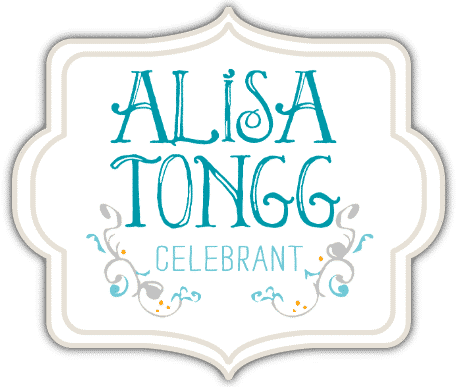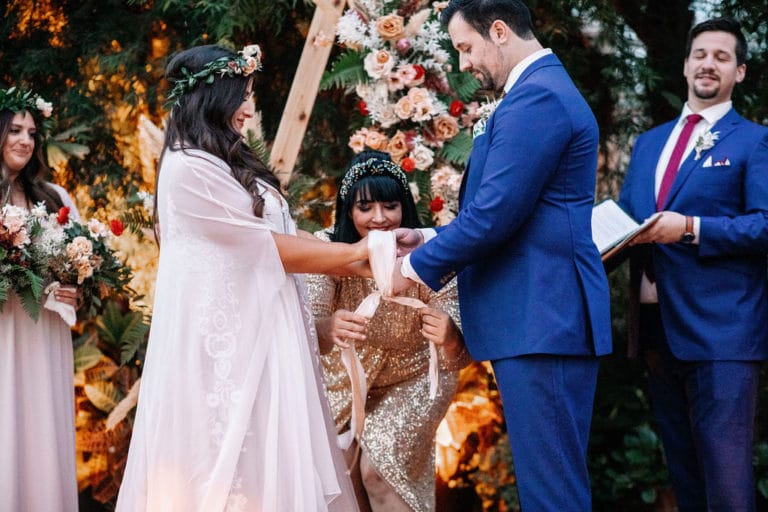1) Can you focus with equal affection on both members of the couple?
Considering that nearly half of all couples ask a friend or family member to do the honors of officiating their ceremony, it’s important to know that your dearly beloved potential-officiant is willing to do a deep dive with the couple to create a heartfelt and legal ceremony. Are they comfortable with public speaking especially when emotions may be high? Can they create a balanced message that celebrates the contributions and personalities of both members of the marriage and their families? I’ve created an online video course to guide friend officiants through the process, included in the course are an inclusive starter ceremony script, couple’s questionnaires, a primer on vows, legal pathways for lay officiants in all 50 states, and a coaching lesson on public speaking and performance. www.weddingceremonymasterclass.com $299
2) What’s your process for creating the wedding ceremony?
By asking this question, you will be able to learn more about a bunch of other important sub-topics like: “How do you get to know your couples?,” “Will we have input in what you say during the ceremony?,” “Will you help us with our vows?”
A professional wedding officiant or life-cycle celebrant will most likely have detailed open-ended questionnaires that the couple will use to share more about themselves, their families, how they met, what makes them special together, what they are hoping for in the future—and then use those responses as a jumping off point when creating a custom ceremony. Religious officiants will most likely also require a series of pre-marital counseling sessions to determine if the couple is prepared to marry (those sessions could involve a separate additional fee.) A civil servant like a judge, mayor or justice of the peace does not prepare custom ceremonies, so their process is simpler and focused on the legalities.
3) We don’t want guests taking photos and videos during the ceremony, can you help us?
What you are asking for is an unplugged ceremony and your officiant can absolutely help you create an expectation and boundary with your guests so that someone’s aunt isn’t leaning into the aisle with her iPad blocking the professional photographer’s shot of your once in a lifetime first kiss. Along with a posted sign, a printed request on your ceremony programs (hey, some people need lots of impressions before it registers!) you can ask your officiant to make an announcement before anybody comes up the aisle at the start of ceremony. I find it’s helpful to remind the guests to turn the volume off of their cell phones and other electronic devices first, and then ask them to put them away and be fully present as witnesses for the relatively short but precious ceremony. People might still take some stealth photos of your ceremony, but at least they will not be in the aisle blocking your professional team. Another hybrid option is to allow for one minute right before the end of the ceremony, for everyone to take their phones and cameras out and snap away. If people know that they will be allowed to take a beautifully composed photo for their Instagram or TikTok wedding video, they will be able to relax and connect with the rest of the ceremony when their witness is most important. Listening to how the officiant has handled this request (and maybe unruly people) in the past will give you an idea of the presence they are able to command.
4) What does the officiant do and what are your fees?
As more couples are wanting an inclusive, non-religious, interfaith or intercultural wedding ceremony that is about them and the life they are building together, the trend has been for people to hire a professional wedding officiant for the love story-focused non-denominational wedding ceremony of their dreams. There are different types of officiants: Life-Cycle Celebrant, Professional Wedding Officiant, Religious Leader, Civil Servant or Friend.
The typical scope of service for an officiant involves preparing a ceremony to the couple’s specifications, dressing for and traveling to the wedding venue, performing the ceremony on the wedding day, and completing the legal paperwork (provided by the couple) and returning it to the issuing courthouse.
Ranges: Professional Officiants and Life-Cycle Celebrants $800-$2200, Religious Leaders $500+donation, Civil Servants (Mayors, Judges, JPs) $250-400
5) What is the ideal length of ceremonies you preform?
Almost all couples who ask this question are trying to find a polite way of ensuring that their officiant choice is committed to making their ceremony a no-boredom zone for the guests. A drive-thru wedding chapel in Vegas, I-do’s in a judge’s chamber at City Hall, a personalized wedding ceremony showcasing your love story and hopes for the future at the venue of your choosing, a priest performing a marriage rite and sacrament, and a loved one doing a ceremony for the first time — are all very different ceremony experiences that take different amounts of time. Most modern wedding venues who host the ceremony, cocktail hour and reception allot about 30-45 minutes for the ceremony in the flow of the day. A ceremony that runs 25-30 minutes is ideal for guest enjoyment, comfort for the couple and wedding party who most likely are standing.
6) Do you meet the statute and legal requirements for an officiant in the location of the marriage ceremony?
There can be some confusion over where a couple should apply for a marriage license, especially if their ceremony will in a different state from where they reside. Thanks to the 2015 Supreme Court ruling on marriage equality, it doesn’t matter where you reside and where you marry when it comes to having your marriage recognized federally. Each state has different laws about when and where couples can apply, how long the license is good for once issued, where the license can be physically used, and who is recognized by that state to sign that legal paperwork. You’ll want to look at the marriage statutes (that’s the laws) that apply to the place that your ceremony is to take place and look to see what requirements the local government has for authorized officiants. In some states any ordained minister (including online ministers) can marry you. In Colorado and Pennsylvania, you can legally marry yourselves with just two witness signatures. And still a handful of states require that the ordained minister has a congregation of their own. I love officiating ceremonies in the State of New Jersey because in 2014 they added Certified Civil Celebrants to their marriage code as authorized officiants, and I love signing “Celebrant” on the marriage certificate as my title. Don’t feel awkward asking this credential question, this is ultimately your responsibility as you don’t want to have the legal status of your marriage in question one day down the road.
7) Are you able to perform the specific rite that’s important to us?
Whether your vision for what makes a wedding ceremony meaningful includes a Handfasting, Breaking the Glass, Jumping the Broom, Ketubah Signing, Stefana Greek Orthodox crowns, Hindu Seven Steps, Native Sacred Smoke Blessing, Lazo Ceremony, Sofreh Table, Exchanging of Garlands or Leis, Indigenous Blanket Bundling, Religious Blessing or Prayer, Sacrament of Matrimony, Bilingual readings, etc., you’ll want to make sure that your officiant is someone who can properly administer this rite and lead the ritual authentically.
Etiquette
Do: Look at the officiant’s website and social media to get an idea of their style, what they wear, how people respond to their performance and presence.
Don’t: Ask to see a video of someone else’s ceremony unless you wouldn’t mind hiring an officiant who would also share your private wedding ceremony with potential clients in the future.
Alisa Tongg is an award-winning certified Life-Cycle Celebrant and ordained minister who has been creating and performing personal ceremonies for nearly a decade, with hundreds of five-star reviewed weddings. As a graduate of the Celebrant Foundation and Institute she studied and formally trained to become a ceremony expert for interfaith, intercultural and religiously unaffiliated couples as well as for blended families. Alisa Tongg is a storyteller, ambassador of Aloha, Citizen of Cherokee Nation and the creator of the first-ever class to help friend officiants marry their friends. She lives on a ridge overlooking the Appalachian Trail in the Pocono Mountains, and primarily serves New York, New Jersey and Pennsylvania www.Alisatonggcelebrant.com



